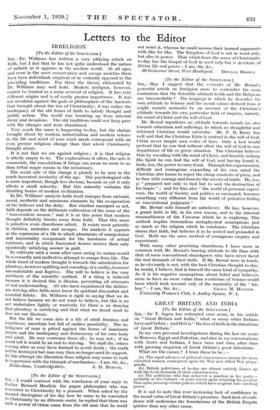Letters to the Editor
IRRELIGION
[To the Editor of the SPECTATOR.]
Sin,—Dr. Williams has written a very edifying article on faith, but I feel that he has not quite understood the nature of unfaith as it appears in the modern world. At all ages, and even in the most conservative and savage societies there have been individuals sceptical of or violently opposed to the prevailing traditions. For them the theory elaborated by Dr. Williams may well hold. Modern irreligion, however, cannot be treated as a mere reversal of religion. It has very different origins and is of vastly greater importance. It was not revulsion against the gods or philosophers of the Ancients that brought about the rise of Christianity; it was rather the inadequacy of the old forms of faith to satisfy thought and justify action. The world was breaking up from internal decay and invasions. The old traditions could not keep pace with the changes and were abandoned.
Very much the same is happening to-day, but the change brought about by modern industrialism and modern science in the life and mind of man must needs correspond with an even greater religious change than that which Christianity brought about.
It is not that we are against religion ; it is that religion is utterly empty to us. The explanations it offers, the acts it commends, the consolations it brings can mean no more to us than tribal magic means to the missionary.
The social side of this change is plainly to be seen in the much lamented secularity of the age. The psychological side is more important, though less obvious, because as yet it only affects a small minority. But this minority contains the directing burins of modern civilization.
In Dr. Williams' analysis faith itself emerges from rational, moral, aesthetic and numinous elements by the co-operation of the believer and the deity. But whether emergent or not, faith depends on the deliberate cultivation of the sense of the transcendent unseen," and it is at this point that modern thought definitely breaks away from faith. That this sense is primitive even churchmen admit. It exists most patently in children, neurotics and savages. On analysis it appears as the expression of a life in which phantasies of omnipotence and immortality compensate for the harshness of actual existence, and in which frustrated desires receive their only egoistically satisfying answer in guilt.
To cultivate such a sense after once seeing its nature would he a cowardly and ineffective attempt to escape from life. The whole trend of modern thought is towards the substitution for phantasy, however uplifting and consoling, of a reality, however uncomfortable and fugitive. The will to believe is the very antithesis of the scientific method. If a thing is believed because it is desired this is illusion, perverting all attempts at real understanding. All who have experienced the deliber- ate striving after faith must know its spiritual discomfort and essential falsity. Dr. Williams is right in saying that we do not believe because we do not want to believe, but this is no act undertaken lightly or wantonly for there is no denying that phantasy is satisfying and that what we dread most to lose are our illusions.
But the life we come into is a life of adult freedom and experience, uncertain but full of endless possibility. The in- telligence of man is pitted against the forces of inanimate nature and the inadequacy and disharmony of his own body and mind. He may overcome them all ; he may not ; if we could tell it would be an end to striving. We shall die, others coming after us may have learned to avoid death ; the earth will be destroyed but man may then no longer need its support. In this attempt the liberation from religion may come to rank in importance with the triumph of mechanism.—I am, Sir, &c.,










































 Previous page
Previous page